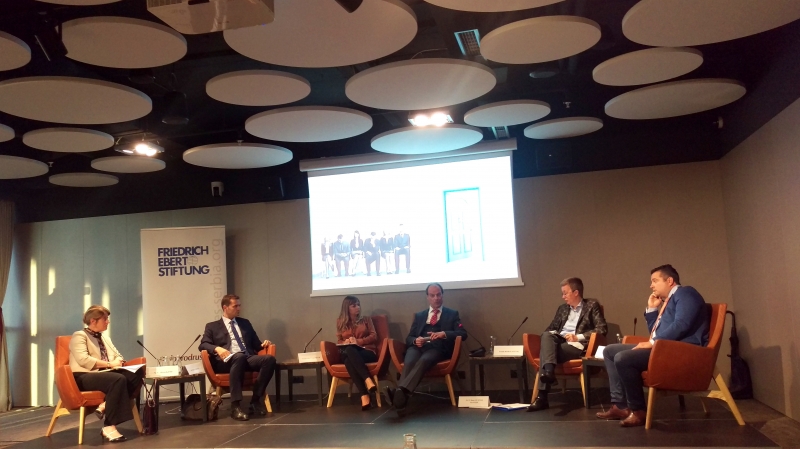Chairperson of the Committee on European Integration, Mr Adrijan Vuksanović, participated today at the round table on "Will Berlin Plus change the EU enlargement policy?". The event was organised by the NGO Center for Civic Education, in cooperation with the Friedrich Ebert Foundation.
Introductory presentations at the event have been delivered by Ms Daliborka Uljarević, Executive Director of the Center for Civic Education and Ms Ursula Koch - Laugwitz, Director of the Regional Office of the Friedrich Ebert Foundation, and at the round table also spoke, besides the Chairperson Vuksanović, H.E. Mr Hans Ginter Matern, Ambassador of the Federal Republic of Germany to Montenegro, Mr Ivan Leković, Director General for Bilateral Affairs at the Ministry of Foreign Affairs and H.E. Ms Alison Kemp, Ambassador of the United Kingdom to Montenegro.
Chairperson Vuksanović emphasised the importance of the Berlin Process as a model for further impetus to the reform process in the region, and praised the implementation of important projects in the field of regional transport and energy infrastructure, as well as the opening of the Regional Office for Youth Cooperation. On the occasion of the promissory note of the European Commission President, Mr Jean-Claude Juncker, in which 2025 has been mentioned as a year of prospects for the accession of Montenegro and Serbia to the Union, Mr Vuksanović said that Montenegro has acted responsibly, advocating that each country be judged according to its own progress in the process reforms. He also pointed out that our country has been fully prepared to provide political and technical assistance to other countries of the region.
Panelists agreed that the Berlin Process was not a substitute, but a complement to the existing process of negotiations with the European Union, and expressed their unreserved support for the "regatta" principle, as a valid model for evaluating the individual progress of candidate countries on the path to the EU.
Members of the Committee on European Integration, Ms Marija Ćatović and Mr Mihailo Anđušić, as well as numerous representatives of political parties, non-governmental organisations and the academic community, participated in the discussion.












